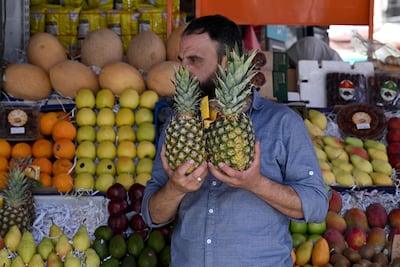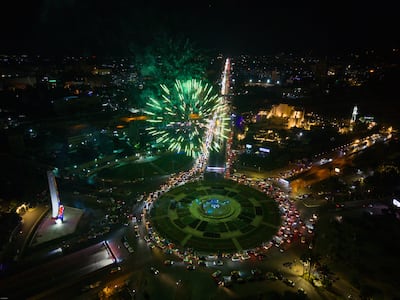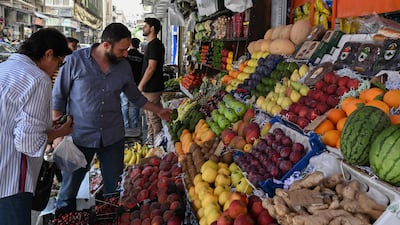A Tesla Cybertruck rolls through Damascus as investors hatch plans to build a Trump Tower and McDonald’s franchises – this is the future some are predicting for Syria under President Ahmad Al Shara, a former Al Qaeda insurgent turned statesman.
With western sanctions lifted to great fanfare and Mr Al Shara winning praise from US President Donald Trump as a “young, attractive guy”, Syria’s Islamist rulers now have almost free rein to steer the once-isolated economy into the global marketplace.
But while the removal of sanctions has rejuvenated Syrians battered by 14 years of civil war, officials have warned in interviews with The National that recovery is “not like flipping a switch” and hinges on a series of crucial reforms.
“If we manage to design a reliable legal environment, inject capital into productive sectors and free the market from bureaucratic constraints, we will begin to see signs of improved economic activity in less than a year,” said Hassan Al Ahmed, a spokesman for the Ministry of Economy.
“However, reaching stable and sustainable growth rates will take longer, depending on how quickly reforms are implemented.”
Officials said the priorities for economic recovery include reforming laws and administrative procedures to attract investors, securing capital for major infrastructure projects, and overhauling the banking sector.
In two signs of progress on Wednesday, a deal was revealed between Syria and four companies to expand its electric grid by 5,000 megawatts – potentially doubling supply – and a ship carrying almost 30,000 tonnes of wheat arrived at Syria's Tartus port, the first such shipment under the new regime.
However, Syria's recovery could be undermined by its volatile political landscape and simmering sectarian tensions. Uncertainty also surrounds the economic path Syria will follow as it transitions from a system of cronyism to a market economy, a tricky process that involves redefining the state’s role and opening the private sector to international markets while protecting domestic industry.
“Reforms are not an instant miracle,” Mr Al Ahmed said.
'Hundreds' of investment proposals
While achieving sustainable growth may take time, Mr Trump’s surprise announcement on sanctions relief has made an immediate impact by piquing the interest of foreign investors. “The visits that used to be exploratory turned into actual investment proposals,” said Ayman Hamawiye, head of Syria’s Investment Authority.
The organisation told The National it has received hundreds of letters expressing interest, including from dozens of western companies. “We’re currently in negotiations on several projects with them,” Mr Hamawiye said.
Some major firms established a foothold immediately after the sanctions were lifted. DP World, the port operator in Dubai, signed a deal worth $800 million with the Syrian government to rebuild the port of Tartus and manage operations.
Now, the government’s main focus is on restructuring the legal framework – including rolling out a new investment law – as well as streamlining administrative procedures to ensure transparency and provide investors with clarity.
Economy Ministry spokesman Mr Al Ahmed said the government is issuing new directives and rescinding old ones every day in a bid to foster a more business-friendly climate.
The task is considerable: under former president Bashar Al Assad, who was toppled by rebels in December, the economy had been controlled by a small network of warlords close to the regime, with businesspeople constantly at risk of being expropriated in favour of better-connected cronies.
Another top priority for Syria is the recovery of its banking sector. In an interview with The National, Central Bank Governor Abdul Kader Husriyeh said restoring financial transfer channels and reintegrating the banking system into global payment networks are vital components of the recovery plan.
The lifting of sanctions does not mean correspondent banks will automatically resume ties with Syrian banks, which they severed years ago, complicating the flow of foreign capital into the country.
“It’s been more than a decade since Syrian banks were completely cut off from the international financial system, so everything related to anti-money laundering is potentially out of date,” said Benjamin Feve, a senior research analyst at Karam Shaar Advisory. “International banks may need time to assess compliance before re-establishing ties.”
To protect or not to protect
The transition to a market economy could take different paths; from a radical embrace of free-market principles to a more mixed approach that retains some level of protectionism to shield key sectors of the economy.
Officials who spoke to The National appeared to favour a more gradual approach, advocating some protective measures to remain in place to support Syrian production.
“We are heading towards a free market, but there are still protective measures for local production during this transitional phase, maybe for a few years, such as maintaining tariffs on imports, so that local products can retain a reasonable margin and mature to become competitive in the global market,” said Investment Authority chief Mr Hamawiye.
But others close to the Ministry of Economy are pushing for a more aggressive leap towards a fully free-market system, lured by the siren of endless profits in an economy where everything needs rebuilding and demand appears limitless.
“Businessmen are now joking about who’s going to bring McDonald’s into Syria,” said Thaer Laham, managing director of the Syrian Business Council, which advocates for the Syrian private sector at both the national and international level.
“But reviving the economy isn’t about this, it’s not about who lands the brand names that will soon flood the market – it’s about empowering the Syrian economy to survive.”
He called for the launch of national dialogue to help channel investment towards sectors that align with Syria’s needs. So far, he said, the nation appears indecisive about which policy path to take.
“We need a strategic plan – right now, we don’t have one. There’s no shared vision among the key stakeholders,” he said.
Cautious optimism
Potential pitfalls litter the road to recovery. Some US restrictions on trade remain in place, and others, imposed under the Caesar Act, a US sanctions law adopted in 2019 to punish the regime of Mr Al Assad, have been lifted only temporarily under a six-month waiver.
The temporary nature of the sanctions relief may dampen enthusiasm for the kind of long-term investment needed for major infrastructure projects.
The West has hinted at what it expects the new Syrian government to deliver. During a brief meeting with Mr Al Shara this month, Mr Trump urged Syria to establish ties with Israel, assist the US in preventing a resurgence of ISIS and deport “foreign terrorists”.
Additionally, western governments have reaffirmed the need for an inclusive government in a country still fractured by more than a decade of civil war.
“But what does that mean in concrete terms? And if these are not achieved, could the sanctions return?” said Mr Feve.
Another major concern is security. In March, a spree of sectarian killings shook Syria's coastal region, home to the Alawite minority to which former president Mr Al Assad belongs. While the violence has subsided, instability lingers in the area, which has tourism potential.
“Are international companies really going to invest in tourism along the coast?” Mr Feve said. “It’s far from certain, given the risk of renewed tensions. We also still hear reports about the Islamic State [ISIS] cells and persistent security threats in other areas.”
Despite all the challenges, Syrian businessman Mr Laham is optimistic, though cautiously.
“We need to be mindful of what the next steps are going to be,” he told The National. “But we also need to keep in mind that just six months ago, saying the word ‘dollar’ out loud could land you seven years in prison. Now, it’s everywhere.”
Mohammed bin Zayed Majlis
Company%C2%A0profile
%3Cp%3E%3Cstrong%3EName%3A%20%3C%2Fstrong%3EPyppl%3C%2Fp%3E%0A%3Cp%3E%3Cstrong%3EEstablished%3A%20%3C%2Fstrong%3E2017%3C%2Fp%3E%0A%3Cp%3E%3Cstrong%3EFounders%3A%20%3C%2Fstrong%3EAntti%20Arponen%20and%20Phil%20Reynolds%26nbsp%3B%3C%2Fp%3E%0A%3Cp%3E%3Cstrong%3EBased%3A%3C%2Fstrong%3E%20UAE%3C%2Fp%3E%0A%3Cp%3E%3Cstrong%3ESector%3A%3C%2Fstrong%3E%20financial%20services%3C%2Fp%3E%0A%3Cp%3E%3Cstrong%3EInvestment%3A%3C%2Fstrong%3E%20%2418.5%20million%3C%2Fp%3E%0A%3Cp%3E%3Cstrong%3EEmployees%3A%3C%2Fstrong%3E%20150%3C%2Fp%3E%0A%3Cp%3E%3Cstrong%3EFunding%20stage%3A%3C%2Fstrong%3E%20series%20A%2C%20closed%20in%202021%3C%2Fp%3E%0A%3Cp%3E%3Cstrong%3EInvestors%3A%3C%2Fstrong%3E%20venture%20capital%20companies%2C%20international%20funds%2C%20family%20offices%2C%20high-net-worth%20individuals%3C%2Fp%3E%0A
KILLING OF QASSEM SULEIMANI
Killing of Qassem Suleimani
How to help
Send “thenational” to the following numbers or call the hotline on: 0502955999
2289 – Dh10
2252 – Dh 50
6025 – Dh20
6027 – Dh 100
6026 – Dh 200
Killing of Qassem Suleimani
Europe’s rearming plan
- Suspend strict budget rules to allow member countries to step up defence spending
- Create new "instrument" providing €150 billion of loans to member countries for defence investment
- Use the existing EU budget to direct more funds towards defence-related investment
- Engage the bloc's European Investment Bank to drop limits on lending to defence firms
- Create a savings and investments union to help companies access capital
The five pillars of Islam
More from Neighbourhood Watch:
Illegal%20shipments%20intercepted%20in%20Gulf%20region
%3Cp%3EThe%20Royal%20Navy%20raid%20is%20the%20latest%20in%20a%20series%20of%20successful%20interceptions%20of%20drugs%20and%20arms%20in%20the%20Gulf%3C%2Fp%3E%0A%3Cp%3E%3Cstrong%3EMay%2011%3A%20%3C%2Fstrong%3EUS%20coastguard%20recovers%20%2480%20million%20heroin%20haul%20from%20fishing%20vessel%20in%20Gulf%20of%20Oman%3C%2Fp%3E%0A%3Cp%3E%3Cstrong%3EMay%208%3A%3C%2Fstrong%3E%20US%20coastguard%20vessel%20USCGC%20Glen%20Harris%20seizes%20heroin%20and%20meth%20worth%20more%20than%20%2430%20million%20from%20a%20fishing%20boat%3C%2Fp%3E%0A%3Cp%3E%3Cstrong%3EMarch%202%3A%3C%2Fstrong%3E%20Anti-tank%20guided%20missiles%20and%20missile%20components%20seized%20by%20HMS%20Lancaster%20from%20a%20small%20boat%20travelling%20from%20Iran%3C%2Fp%3E%0A%3Cp%3E%3Cstrong%3EOctober%209%2C%202022%3A%20%3C%2Fstrong%3ERoyal%20Navy%20frigate%20HMS%20Montrose%20recovers%20drugs%20worth%20%2417.8%20million%20from%20a%20dhow%20in%20Arabian%20Sea%3C%2Fp%3E%0A%3Cp%3E%3Cstrong%3ESeptember%2027%2C%202022%3A%3C%2Fstrong%3E%20US%20Naval%20Forces%20Central%20Command%20reports%20a%20find%20of%202.4%20tonnes%20of%20heroin%20on%20board%20fishing%20boat%20in%20Gulf%20of%20Oman%C2%A0%3C%2Fp%3E%0A
GOLF’S RAHMBO
- 5 wins in 22 months as pro
- Three wins in past 10 starts
- 45 pro starts worldwide: 5 wins, 17 top 5s
- Ranked 551th in world on debut, now No 4 (was No 2 earlier this year)
- 5th player in last 30 years to win 3 European Tour and 2 PGA Tour titles before age 24 (Woods, Garcia, McIlroy, Spieth)
The years Ramadan fell in May
UAE currency: the story behind the money in your pockets
The Voice of Hind Rajab
Starring: Saja Kilani, Clara Khoury, Motaz Malhees
Director: Kaouther Ben Hania
Rating: 4/5
UAE currency: the story behind the money in your pockets
RESULT
Arsenal 1 Chelsea 2
Arsenal: Aubameyang (13')
Chelsea: Jorginho (83'), Abraham (87')
UAE currency: the story behind the money in your pockets
Company%20profile
%3Cp%3E%3Cstrong%3ECompany%20name%3A%3C%2Fstrong%3E%20FinFlx%3C%2Fp%3E%0A%3Cp%3E%3Cstrong%3EStarted%3A%3C%2Fstrong%3E%20January%202021%3C%2Fp%3E%0A%3Cp%3E%3Cstrong%3EFounders%3A%3C%2Fstrong%3E%20Amr%20Yussif%20(co-founder%20and%20CEO)%2C%20Mattieu%20Capelle%20(co-founder%20and%20CTO)%3C%2Fp%3E%0A%3Cp%3E%3Cstrong%3EBased%20in%3A%3C%2Fstrong%3E%20Dubai%3C%2Fp%3E%0A%3Cp%3E%3Cstrong%3EIndustry%3A%3C%2Fstrong%3E%20FinTech%3C%2Fp%3E%0A%3Cp%3E%3Cstrong%3EFunding%20size%3A%3C%2Fstrong%3E%20%241.5m%20pre-seed%3C%2Fp%3E%0A%3Cp%3E%3Cstrong%3EInvestors%3A%3C%2Fstrong%3E%20Venture%20capital%20-%20Y%20Combinator%2C%20500%20Global%2C%20Dubai%20Future%20District%20Fund%2C%20Fox%20Ventures%2C%20Vector%20Fintech.%20Also%20a%20number%20of%20angel%20investors%3C%2Fp%3E%0A
The five pillars of Islam
Killing of Qassem Suleimani
Mohammed bin Zayed Majlis
Key facilities
- Olympic-size swimming pool with a split bulkhead for multi-use configurations, including water polo and 50m/25m training lanes
- Premier League-standard football pitch
- 400m Olympic running track
- NBA-spec basketball court with auditorium
- 600-seat auditorium
- Spaces for historical and cultural exploration
- An elevated football field that doubles as a helipad
- Specialist robotics and science laboratories
- AR and VR-enabled learning centres
- Disruption Lab and Research Centre for developing entrepreneurial skills
SPEC SHEET
Display: 6.8" edge quad-HD dynamic Amoled 2X, Infinity-O, 3088 x 1440, 500ppi, HDR10 , 120Hz
Processor: 4nm Snapdragon 8 Gen 1/Exynos 2200, 8-core
Memory: 8/12GB RAM
Storage: 128/256/512GB/1TB
Platform: Android 12
Main camera: quad 12MP ultra-wide f/2.2, 108MP wide f/1.8, 10MP telephoto f/4.9, 10MP telephoto 2.4; Space Zoom up to 100x, auto HDR, expert RAW
Video: 8K@24fps, 4K@60fps, full-HD@60fps, HD@30fps, super slo-mo@960fps
Front camera: 40MP f/2.2
Battery: 5000mAh, fast wireless charging 2.0 Wireless PowerShare
Connectivity: 5G, Wi-Fi, Bluetooth 5.2, NFC
I/O: USB-C
SIM: single nano, or nano and SIM, nano and nano, eSIM/nano and nano
Colours: burgundy, green, phantom black, phantom white, graphite, sky blue, red
Price: Dh4,699 for 128GB, Dh5,099 for 256GB, Dh5,499 for 512GB; 1TB unavailable in the UAE
More on animal trafficking
Read more about the coronavirus
The five pillars of Islam
1. Fasting
2. Prayer
3. Hajj
4. Shahada
5. Zakat
More on animal trafficking
Killing of Qassem Suleimani
Dirham Stretcher tips for having a baby in the UAE
Selma Abdelhamid, the group's moderator, offers her guide to guide the cost of having a young family:
• Buy second hand stuff
They grow so fast. Don't get a second hand car seat though, unless you 100 per cent know it's not expired and hasn't been in an accident.
• Get a health card and vaccinate your child for free at government health centres
Ms Ma says she discovered this after spending thousands on vaccinations at private clinics.
• Join mum and baby coffee mornings provided by clinics, babysitting companies or nurseries.
Before joining baby classes ask for a free trial session. This way you will know if it's for you or not. You'll be surprised how great some classes are and how bad others are.
• Once baby is ready for solids, cook at home
Take the food with you in reusable pouches or jars. You'll save a fortune and you'll know exactly what you're feeding your child.
Paris%20Agreement
%3Cp%3EArticle%2014%3C%2Fp%3E%0A%3Cp%3E1.%20%5BThe%20Cop%5D%20shall%20periodically%20take%20stock%20of%20the%20implementation%20of%20this%20Agreement%20to%20assess%20the%20collective%20progress%20towards%20achieving%20the%20purpose%20of%20this%20Agreement%20and%20its%20long-term%20goals%20(referred%20to%20as%20the%20%22global%20stocktake%22)%3C%2Fp%3E%0A%3Cp%3E2.%20%5BThe%20Cop%5D%20shall%20undertake%20its%20first%20global%20stocktake%20in%202023%20and%20every%20five%20years%20thereafter%C2%A0%3C%2Fp%3E%0A
Killing of Qassem Suleimani
More from Neighbourhood Watch:
The five pillars of Islam
Zayed Sustainability Prize
HIJRA
Starring: Lamar Faden, Khairiah Nathmy, Nawaf Al-Dhufairy
Director: Shahad Ameen
Rating: 3/5
More coverage from the Future Forum
BUNDESLIGA FIXTURES
Friday Hertha Berlin v Union Berlin (11.30pm)
Saturday Freiburg v Borussia Monchengladbach, Eintracht Frankfurt v Borussia Dortmund, Cologne v Wolfsburg, Arminia Bielefeld v Mainz (6.30pm) Bayern Munich v RB Leipzig (9.30pm)
Sunday Werder Bremen v Stuttgart (6.30pm), Schalke v Bayer Leverkusen (9pm)
Monday Hoffenheim v Augsburg (11.30pm)
Zayed Sustainability Prize
TOUR RESULTS AND FIXTURES
June 3: NZ Provincial Barbarians 7 Lions 13
June 7: Blues 22 Lions 16
June 10: Crusaders 3 Lions 12
June 13: Highlanders 23 Lions 22
June 17: Maori All Blacks 10 Lions 32
June 20: Chiefs 6 Lions 34
June 24: New Zealand 30 Lions 15 (First Test)
June 27: Hurricanes 31 Lions 31
July 1: New Zealand 21 Lions 24 (Second Test)
July 8: New Zealand v Lions (Third Test) - kick-off 11.30am (UAE)
KYLIAN MBAPPE 2016/17 STATS
Ligue 1: Appearances - 29, Goals - 15, Assists - 8
UCL: Appearances - 9, Goals - 6
French Cup: Appearances - 3, Goals - 3
France U19: Appearances - 5, Goals - 5, Assists - 1
Killing of Qassem Suleimani
It Was Just an Accident
Director: Jafar Panahi
Stars: Vahid Mobasseri, Mariam Afshari, Ebrahim Azizi, Hadis Pakbaten, Majid Panahi, Mohamad Ali Elyasmehr
Rating: 4/5
The specs
Engine: 3.0-litre six-cylinder turbo
Power: 398hp from 5,250rpm
Torque: 580Nm at 1,900-4,800rpm
Transmission: Eight-speed auto
Fuel economy, combined: 6.5L/100km
On sale: December
Price: From Dh330,000 (estimate)
So what is Spicy Chickenjoy?
Just as McDonald’s has the Big Mac, Jollibee has Spicy Chickenjoy – a piece of fried chicken that’s crispy and spicy on the outside and comes with a side of spaghetti, all covered in tomato sauce and topped with sausage slices and ground beef. It sounds like a recipe that a child would come up with, but perhaps that’s the point – a flavourbomb combination of cheap comfort foods. Chickenjoy is Jollibee’s best-selling product in every country in which it has a presence.
More from Rashmee Roshan Lall
KILLING OF QASSEM SULEIMANI
Where to donate in the UAE
The Emirates Charity Portal
You can donate to several registered charities through a “donation catalogue”. The use of the donation is quite specific, such as buying a fan for a poor family in Niger for Dh130.
The General Authority of Islamic Affairs & Endowments
The site has an e-donation service accepting debit card, credit card or e-Dirham, an electronic payment tool developed by the Ministry of Finance and First Abu Dhabi Bank.
Al Noor Special Needs Centre
You can donate online or order Smiles n’ Stuff products handcrafted by Al Noor students. The centre publishes a wish list of extras needed, starting at Dh500.
Beit Al Khair Society
Beit Al Khair Society has the motto “From – and to – the UAE,” with donations going towards the neediest in the country. Its website has a list of physical donation sites, but people can also contribute money by SMS, bank transfer and through the hotline 800-22554.
Dar Al Ber Society
Dar Al Ber Society, which has charity projects in 39 countries, accept cash payments, money transfers or SMS donations. Its donation hotline is 800-79.
Dubai Cares
Dubai Cares provides several options for individuals and companies to donate, including online, through banks, at retail outlets, via phone and by purchasing Dubai Cares branded merchandise. It is currently running a campaign called Bookings 2030, which allows people to help change the future of six underprivileged children and young people.
Emirates Airline Foundation
Those who travel on Emirates have undoubtedly seen the little donation envelopes in the seat pockets. But the foundation also accepts donations online and in the form of Skywards Miles. Donated miles are used to sponsor travel for doctors, surgeons, engineers and other professionals volunteering on humanitarian missions around the world.
Emirates Red Crescent
On the Emirates Red Crescent website you can choose between 35 different purposes for your donation, such as providing food for fasters, supporting debtors and contributing to a refugee women fund. It also has a list of bank accounts for each donation type.
Gulf for Good
Gulf for Good raises funds for partner charity projects through challenges, like climbing Kilimanjaro and cycling through Thailand. This year’s projects are in partnership with Street Child Nepal, Larchfield Kids, the Foundation for African Empowerment and SOS Children's Villages. Since 2001, the organisation has raised more than $3.5 million (Dh12.8m) in support of over 50 children’s charities.
Noor Dubai Foundation
Sheikh Mohammed bin Rashid Al Maktoum launched the Noor Dubai Foundation a decade ago with the aim of eliminating all forms of preventable blindness globally. You can donate Dh50 to support mobile eye camps by texting the word “Noor” to 4565 (Etisalat) or 4849 (du).
More on Quran memorisation:
The years Ramadan fell in May
Know before you go
- Jebel Akhdar is a two-hour drive from Muscat airport or a six-hour drive from Dubai. It’s impossible to visit by car unless you have a 4x4. Phone ahead to the hotel to arrange a transfer.
- If you’re driving, make sure your insurance covers Oman.
- By air: Budget airlines Air Arabia, Flydubai and SalamAir offer direct routes to Muscat from the UAE.
- Tourists from the Emirates (UAE nationals not included) must apply for an Omani visa online before arrival at evisa.rop.gov.om. The process typically takes several days.
- Flash floods are probable due to the terrain and a lack of drainage. Always check the weather before venturing into any canyons or other remote areas and identify a plan of escape that includes high ground, shelter and parking where your car won’t be overtaken by sudden downpours.
Tu%20Jhoothi%20Main%20Makkaar%20
%3Cp%3E%3Cstrong%3EDirector%3A%20%3C%2Fstrong%3ELuv%20Ranjan%26nbsp%3B%3C%2Fp%3E%0A%3Cp%3E%3Cstrong%3EStars%3A%20%3C%2Fstrong%3ERanbir%20Kapoor%2C%20Shraddha%20Kapoor%2C%20Anubhav%20Singh%20Bassi%20and%20Dimple%20Kapadia%3C%2Fp%3E%0A%3Cp%3E%3Cstrong%3ERating%3A%3C%2Fstrong%3E%203%2F5%3C%2Fp%3E%0A
The years Ramadan fell in May
More from Neighbourhood Watch:
Mohammed bin Zayed Majlis






